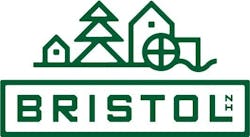
The Town of Bristol, a New Hampshire town of 3,300 permanent residents, this month announced that it is at long last deploying the smart infrastructure necessary to bring high-speed broadband services to its previously underserved rural community.
The major initiative, Bristol Broadband Now, is a long-term effort by the town's Economic Development Committee to build a fiber to the premise (FTTP) network that will provide symmetrical fiber-optic internet to residences throughout Bristol as well as connect businesses, municipal buildings and educational facilities in Bristol and Plymouth, NH.
Bristol Broadband Now is being made possible in part through two separately funded projects.
The first project, supported by a $1.52 million Connecting New Hampshire Emergency Broadband Expansion grant funded by the Coronavirus Aid, Relief and Economic Security (CARES) Act, is a 24-mile fiber route that passes nearly 400 Bristol residences and connects to the NetworkNH system at Plymouth State University (PSU).
The second project will provide the additional fiber backbone and fiber distribution required to connect all Bristol municipal, educational and commercial buildings and is being funded by a Northern Border Regional Commission grant and town appropriation.
After years of planning and strategizing with project stakeholders, the town issued its Request for Proposals in August 2020 for the design, engineering and construction of the network with a completion date of December 15, 2020, in accordance with CARES Act funding regulations.
Bristol was the only municipality in New Hampshire to receive CARES Act grant monies for telecommunications infrastructure.
Following a formal procurement process, the town selected eX² Technology, LLC of Omaha, Neb. to deliver a hybrid network architecture solution using Active Ethernet and Gigabit Passive Optical Network (GPON) technology.
"We knew it would be a challenge to complete the first project in such a tight timeline, but eX² worked collaboratively and proactively with us to get the network constructed on time so we could secure the grant funding," said Bristol's town administrator, Nicholas Coates.
"Ultimately, it's the citizens of Bristol that are the true winners," said Jay Jorgensen, chief operating officer, eX² Technology. "Bristol's unwavering commitment to building this network was very evident during the entire process."
The town envisions the network to be a community asset that provides for future development and prosperity.
"Building a fiber-optic network will provide the speed and bandwidth necessary to support telework, remote schooling and multiple simultaneous connections, allowing Bristol to compete on a regional, national and global level," added Coates. "Neighboring towns have been reaching out to us for guidance on developing similar networks for their communities. We are on the cusp of being a national model for rural communities."
Robin Ingalls-Fitzgerald, CEO and President of Medical Management and Reimbursement Specialists, LLC (MRS) agreed. Headquartered in Bristol, MRS has plans to bring on additional software development staff once the network is fully operational. "We're putting everyone on notice that you can be a small town and still be very thriving," said Ingalls-Fitzgerald.
Bristol Economic Committee chair William Dowey stated that network connections to educational facilities like PSU will help to provide workforce training to COVID-displaced workers and allow educators to introduce area students to new career path opportunities, especially those in technology-related industries.
PSU President Donald Brix also believes the network will positively impact the region's economy.
"The installation of this new fiber-optic infrastructure in Bristol is an example of the substantial investment in New Hampshire's economic future. Allowing residents in the northern regions of the state to have access to the latest in high-speed internet technology is a boon for our faculty, staff, students and everyone in our community. The Lakes Region has long been an active area for both residential and commercial sectors, and this development signals a continuing interest in building a footprint that allows the state to compete with the most connected locales on a national scale," said Brix.
The town hopes its network will spur further development of a tech corridor along I-93 in Northern New Hampshire.
Bristol's second project is on schedule for completion mid-April 2021.